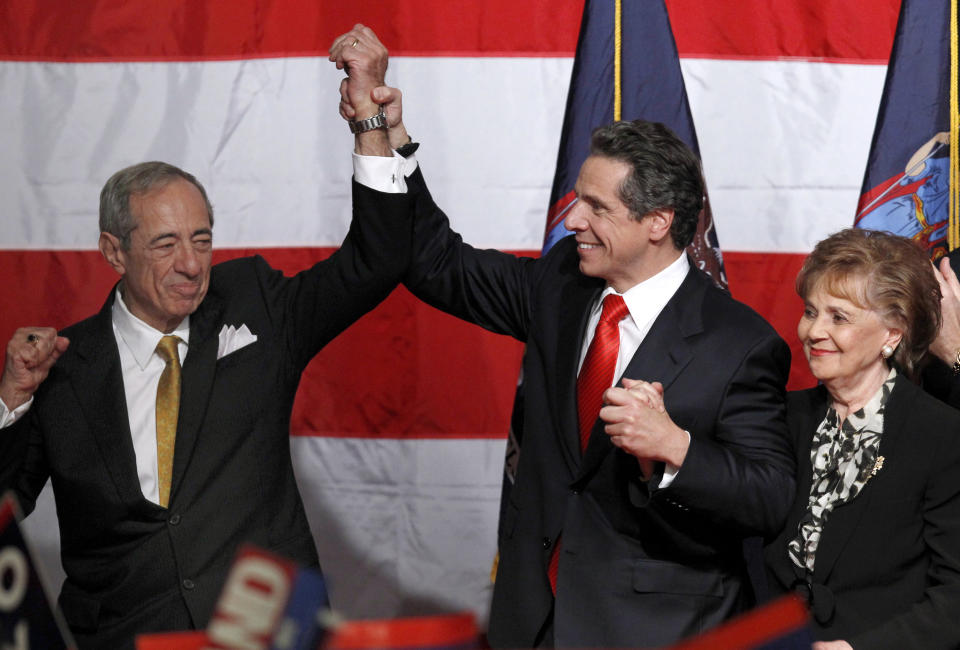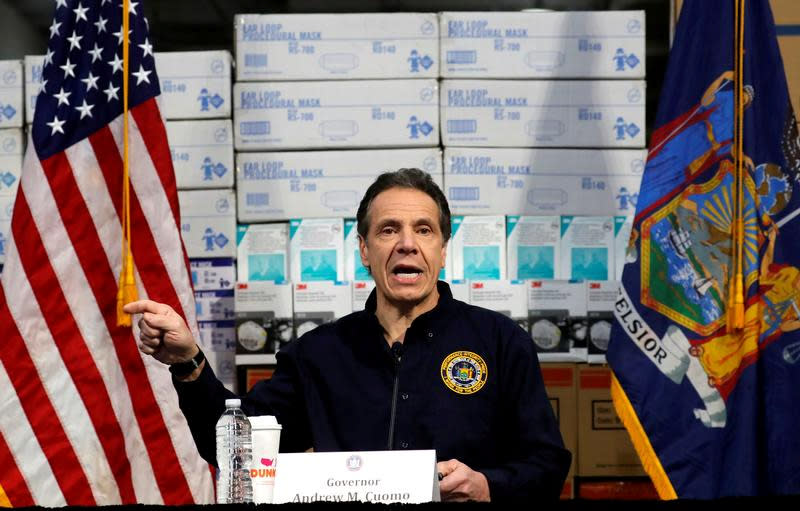What Andrew Cuomo knows
The last time New York faced a crisis of this magnitude, Andrew Cuomo almost destroyed his career.
It was April 2002, and Cuomo, hoping to become the Democratic nominee in that year’s gubernatorial race, delivered an offhand criticism of the Republican incumbent’s response to 9/11: “He stood behind the leader. He held the leader’s coat.”
The leader he was referring to was Rudy Giuliani, then still the most popular man in America. The man who held “the leader’s coat” in Cuomo’s formulation was Gov. George Pataki, who had defeated Andrew’s father, Mario, in the 1994 gubernatorial race.
The blowback to Cuomo’s remark was quick and devastating; it was seen as opportunistic, even thuggish. He dropped out of the race a few days before the Democratic primary. Pataki was reelected in a landslide. A year later, Cuomo’s marriage to Kerry Kennedy messily and very publicly dissolved. By his mid-40s, he was a political has-been, a “Page Six” punchline.
Thankfully, Cuomo learned from his humiliation. The young hothead cooled off, and he no longer acted like a man who felt himself entitled to high office. Instead, he did the work, crawled his way back and got himself elected New York’s attorney general in 2006. He earned high marks at that job, and after a prostitution scandal felled his chief political rival, he was elected governor in a 2010 landslide.

In the decade that’s followed, Cuomo has tried on various ideological personas, none of which seemed to fit all that well. He’s been a cost-cutting moderate one election, a progressive champion the next. While never exactly beloved by his constituents, he remained broadly popular. New Yorkers, while cranky, have basement-level expectations for our elected officials. We’ll put up with a lot so long as they stay out of jail.
Since the beginning of the coronavirus pandemic, much has been made about the newfound prominence of our nation’s governors. A Monmouth University poll released last week indicated that 72 percent of Americans approve of their governor’s performance in handling the crisis. And the most noteworthy of those governors has been Cuomo. In New York, which has been hit hardest by the virus, 87 percent say he’s been doing great job, according to a Siena College poll released Monday.
New York is a massive, unwieldy state that stretches from the Rust Belt to the Hamptons, and getting 87 percent of its population to agree on anything is almost unheard of.
Cuomo has managed this feat because he was one of the first politicians to grasp what the moment demanded.
The aftermath of the 9/11 attacks taught Cuomo that in an emergency, a leader must appear anything but petty and small. He’s also benefited from comparisons to two leaders who had never been forced to learn that lesson, President Trump and New York City Mayor Bill de Blasio.

In moments that are more-or-less safe and stable, when the country is relatively affluent and relatively peaceful, voters are sometimes willing to roll the dice on people like Trump and de Blasio. Both are populists who were elected despite their thin résumés: Trump was a TV star with no record of public service either in politics or the military, while de Blasio had spent his career as a city government apparatchik and semi-successful Democratic operative.
Neither won office on the basis of managerial competence, and both have struggled with a crisis that dwarfs their abilities. Trump, at least, has benefited from his late realization that his reelection depends on his ability to handle the pandemic. In response, he’s tethered himself to two competent professionals, Dr. Deborah Birx and Dr. Anthony Fauci. They lend him an authority he would otherwise lack, and sure enough his approval ratings have inched up.
Fauci and Birx have no special charisma. We know nothing really of their personal political beliefs. And this makes them a perfect fit for a moment when politics is the last thing on anyone’s mind. We’ve even stopped caring about the presidential election, now bumped from the front page by news of shortages, supply chains and infection rates.
Cuomo too benefits from our new reality, as he’s never appeared to have much by way of bedrock political beliefs. Before the virus hit, his tendency to triangulate and oscillate on matters of public policy, his enthusiasm for compromise and bargaining, seemed out of step with an age that rewarded ideological certitude and a refusal to budge.
We’ve spent most of this young century downplaying the importance of résumés when it comes to our political leaders. Before Trump, Barack Obama became the first president elected directly from the Senate in 48 years, reflecting the reputation of senators as talkers, not doers.

In the decades before Obama’s election in 2008, the conventional wisdom held that governors, people who had already proven they could manage a government, had a tremendous leg up when campaigning for the presidency.
If the vice presidency was the best stepping-stone to the big job, the next best was running a state.
The existential danger of the Cold War and its immediate aftermath tended to reward steady hands and careful managers. George W. Bush, Bill Clinton, Ronald Reagan and Jimmy Carter were all governors before becoming president. And their rhetoric aside, as governors they had all distinguished themselves as relatively moderate, even technocratic.
But the polarized political climate of the 2000s has made that route to the presidency less advantageous. Governors operate under certain constraints that force them toward the political center. For one thing, nearly all governors must contend with balanced budget laws that limit their ability to slash taxes and expand services simultaneously. Federal legislators, needless to say, are rarely forced to consider such trade-offs.
The results governors produce are also quantifiable and publicly measurable in each state. To use just one metric, unemployment in a state either goes up or down, and there aren’t many ways for a governor to paper over the statistics.
A senator, meanwhile, can coast for decades on sheer charisma and a well-worked base. When compared to governors, generally speaking, legislators exist in a political reality where the stakes just aren’t that high, and as a result they’re allowed to spend much of their time talking on TV.
Cuomo, having first learned the workings of government at his father’s side in the 1980s, is a reassuring throwback to an era that prized competence. He has cleverly forged a working relationship with Trump, a man notoriously hard to work with. He’s put aside his long-running, personal and sometimes emotional feud with de Blasio. He’s the man for this moment for the same reason he was a bad fit for the last one. Like many of his fellow governors, he understands the era of big bull is over, at least for now.

Cuomo has become so popular, in fact, that some Democrats have begun indulging in a fantasy wherein he somehow becomes their presidential nominee. How this could possibly happen is unclear, but it would likely require the assent or incapacity of Joe Biden, who ran twice for the presidency as a senator and performed dismally, and has only now essentially become the presumptive nominee after an eight-year stint as Obama’s vice president.
It would be a mistake to assume that Cuomo’s approval rating will prove especially durable. Even once the virus retreats, we will be living through its economic consequences for many years to come.
Partially for this reason, our future will still be a populist one. People will come out of this expecting more from their government, not less, and there’s little reason to think that America’s love affair with state-level technocrats will last much beyond the current crisis.
In the meantime, though, we have Cuomo and his fellow governors, the moderates and the managers whose names we may forget when the crisis is past.
We have their experience and their expertise in a time of disaster, their resistance to grand theories of governing, their attention to detail and willingness to adapt.
How good it is to know that our government still has such people.
_____
Click here for the latest coronavirus news and updates. According to experts, people over 60 and those who are immunocompromised continue to be the most at risk. If you have questions, please reference the CDC and WHO’s resource guides.
Read more:

